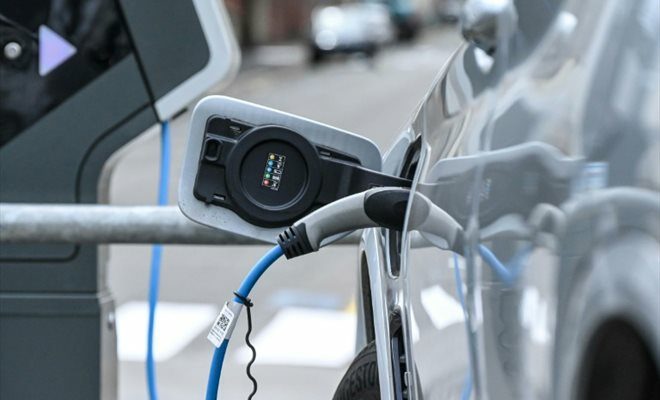Encourage electric vehicles, vegetable proteins in the canteen or “green” ammonia, simple solutions that would offer cascading benefits for the climate, according to a report devoted to “positive tipping points” (AFP/Archives/DENIS CHARLET )
Encouraging electric vehicles, vegetable proteins in the canteen or “green” ammonia: three examples of simple solutions that would offer cascading benefits for the climate, according to a report published Friday devoted to “positive tipping points”.
Scientists regularly warn of climate “tipping points” that would cause catastrophic chain reactions for the planet, such as the extinction of coral reefs or the thawing of permafrost.
But a team led in particular by the British University of Exeter presented levers to bring about irreversible positive effects this time, with the promise of a “decarbonization cascade”, on the occasion of the Davos economic forum in Swiss.
“Each of these super leverage points increases the odds of mobilizing others and could thus trigger a cascade of positive tipping points to steer us away from climate catastrophe,” said Mark Meldrum of Systemiq. co-author of the report.
The first example is that of electric vehicles, where progress is already enormous.
By encouraging an acceleration in this area (with obligations to purchase zero-emission vehicles or a boom in the construction of charging infrastructure), the authors believe that progress would also become irreversible in the sector of renewable electricity coupled with batteries.
These, mass-produced, would indeed become cheaper and more competitive.
Another example: by requiring the introduction of a proportion of 25% green ammonia (produced by electrolysis with electricity from renewable sources, instead of fossil sources) in the production of fertilizers, the cost of electrolysers would drop, and that of green hydrogen as well. Green ammonia and hydrogen could thus be widely used for maritime transport or steel production, replacing gas.
Finally, the authors suggest the path of alternative proteins – mainly of plant origin – which could be encouraged by public procurement in schools, hospitals and administrations. What reduce greenhouse gas emissions related to livestock … and free 7 to 15% of agricultural land, discourage deforestation and protect natural carbon sinks.
These three examples are not exhaustive and “many more links between sectors can be identified”, underlines the report.
“We need to find and trigger positive socio-economic tipping points if we are to limit the risk of damaging climate tipping points,” said Tim Lenton of the University of Exeter, co-author of the report.
“This non-linear way of thinking about the climate problem gives us plausible reasons for hope: the more we invest in the transformation of society and the economy, the faster it will happen, which will make it possible to achieve carbon neutrality more quickly,” he concludes.
© 2023 AFP
Did you like this article ? Share it with your friends with the buttons below.




